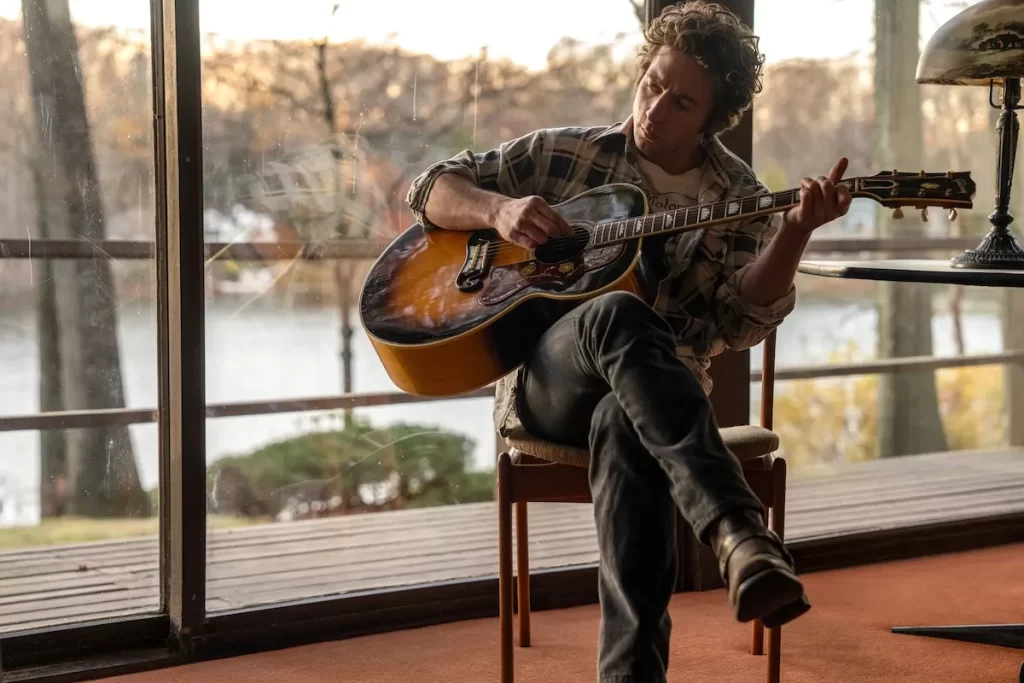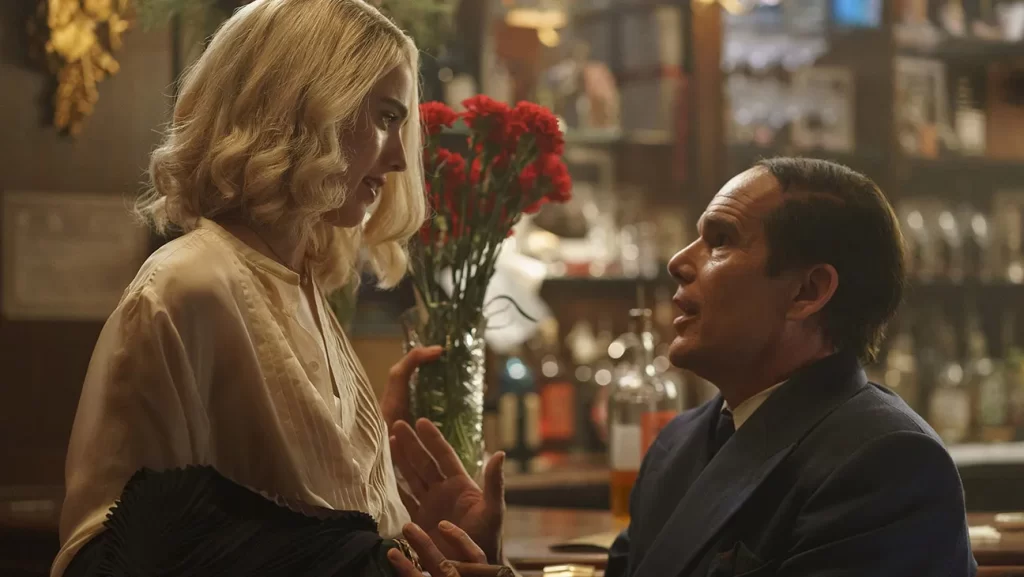Covering virtual/digital film festivals is… something. On one hand, it’s a single parent’s dream: I don’t have to travel or find affordable childcare for a 4-6-day stretch. I don’t get burnout because my viewing schedule is just as flexible as it would be in-person and, to be honest, I’m no longer trying to engage with early-morning press screenings out of one hungover, bloodshot eye. I can get used to it.
On the other hand, that at-home flexibility is a double-edged sword. Six-year-old kids do not care if the screener I’m watching is intense and requires concentration– they want their snack/Paw Patrol/Lego bin and they will not patiently wait for 90 minutes to get it. The biggest element that in-house festivals are missing is the forced immersion that yields blind screenings and surprise gems– I discovered The Five Fingers of Marseilles that way (thanks to Fantastic Fest). Still, word-of-mouth landed some real cinematic treasures on my radar in addition to the flicks I was anticipating.
This year’s theater bizarre gives the world a pandemic, and from there emerged a unique Mighty Morphin’ Megazord of genre festivals. Nightstream, comprised of the Boston Underground Film Festival (MA), the Brooklyn Horror Film Festival, the North Bend Film Festival, the Overlook Film Festival, and Popcorn Frights Film Festival come together to bring out crowd-pleasers and label-defying riches for our viewing pleasure.

If my countless viewings of Evil Dead and Spider Baby have yielded anything, it’s this nugget of wisdom: the key to an effective horror-comedy is to lean in to the natural absurdities of any frightening situation onscreen. So, when an elderly couple (Sheila McCarthy and Julian Richings) kidnaps a young pregnant woman for ritualistic purposes to resurrect their dead grandson, there’s plenty of fodder for fun in Justin G. Dyck’s Anything For Jackson. Becker (Konstantina Mantelos) is the patient of Dr. Walsh (Richings)– the latter of whom has a predictably captivating screen presence– but to the Walshes she is a vessel. Handcuffed to their bed in a soundproof room of their spacious home, the young woman’s screams go unheard while the pair, armed with an ancient spell book, break horror’s golden rule: never read the Latin. Screenwriter Keith Cooper imagines a benign pair of grandparents bumbling their way through dark magic and finding themselves way in over their heads. Crisp dialogue and a steady, lean cadence on the page work in tandem with stellar performances from McCarthy and Richings to ensure that every joke lands and every scare strikes.
Rose Plays Julie is fundamentally an adoption plot. But that doesn’t do justice to the intense character study at its core nor the subverted family dynamics at play. It begins with an adopted young woman, Rose (Ann Skelly), who tracks down her birth mother Ellen (Orla Brady), only to find that mom has no desire to meet her. The how and the why of the circumstances surrounding Rose’s birth slowly bubble to the narrative surface in a patient and relatively bloodless psychological thriller. It’s anchored by a trio of top-tier performances from Skelly, Brady, and Aiden Gillen; all three convey more in what’s left unsaid than in any melodramatic outburst. Without spoiling too much, it’s awe-inspiring to see such dark subject matter as [redacted] and [redacted] treated with such respect and delicacy within a fictional universe that communicates solely in a language of coldness.
Honeydew is a feature-length sideshow act that doesn’t care how uncomfortable you are, you are going to sit for minutes and finish your plate. A pair of young lovers, Sam (Sawyer Spielberg) and Rylie (Malin Barr) are stranded out in the New England backwoods and wind up at the nearest home they can find in the middle of the night. The home, owned by a strange elderly local and her son, contains a handful of sinister secrets. Devereux Milburn’s feature debut wears its Texas Chain Saw Massacre reverence on its sleeve; beyond the structural rural horror similarities, the score is the single greatest reminder, filled with disparate sounds including a knife scraping across honing steel. A macabre, deadpan sense of humor, peppered into both the dialogue and jarring match-cuts, keeps the film from taking itself too seriously, making for entertaining viewing between the creepier moments. Despite a strong sense of tension-building, the movie is bumps, shadows, and prolonged eye contact for the first hour, threatening to wear out its welcome before the big reveal happens. When it does, however, it strays enough from the Texas Chain Saw sandbox to make the wait worthwhile. The role of Karen, played by Barbara Kingsley, is the juiciest and the most fun to watch among a cadre of unlikable characters (which doesn’t hamper the story at all). With unblinking stares that prompt suspicion (is she plotting something or just spaced out?), Kingsley greets the uncanny in her performance as if it were an old friend. Despite a slightly indulgent runtime, Honeydew is a true-blue Dionysian tale that eventually subverts expectations.

Every once in a while a horror film comes along that nails a specific, uncanny feeling. Come True knows and shows precisely what it’s like in that brief, stomach-churning moment when a strange but tolerable dream turns into a strange and core-shaking nightmare. Teen runaway Sarah (Julia Sarah Stone) takes part in a sleep study and, through that, tumbles down the rabbit hole of her own psyche in a tense exploration of the omniscience of dreams. Layering the narrative with a visual texture of apprehension and doubt, writer-director Anthony Scott Burns channels the same pale-blue aesthetics that elevated his “Father’s Day” segment above all others in 2016’s Holidays. As Stone’s sad, wide eyes fill the frame, she commands attention and empathy with a single, pleading look as she navigates a quietly hostile dream world. From disciplined, sustained takes to the hauntingly phobic score (both the cinematography and the music are credited to Burns, as well) the entire runtime is drenched in the unshakeable feeling that something is amiss; the result of every filmmaking element working in sync at the command of a writer-director with a singular, unshakeable vision. Come True is one to behold, and Burns is one to watch.
Reunion is kind of like Fight Club; you can’t talk about it for fear of spoiling the utterly bonkers-in-Yonkers shenanigans therein. A pregnant, mentally strained scholar (Emma Draper) returns to her late grandparents’ family home to work on her latest work (on experimental science) and to reconnect with her estranged mother; strange things happen. It sounds simple enough, but I cannot emphasize enough how hard the left turn is in the plot. The set design is filled with motifs like wallpaper patterns and multiples of the same household item, adding to a visual language of recall and repetition. A single-setting narrative can rapidly get dusty, but director Jake Mahaffy’s command of movement keeps things engaging even during the more intimate moments. What seems like a predictable Silent House structure and a safe J-horror cadence mutates into a borderline-campy B-movie cleverly disguised as a lofty Tarkovsky homage– and I mean this as the highest of praise. Go in as blind as possible on this one.
The Queen of Black Magic does the absolute most with the least. When Hanif (Ario Bayu) brings wife Nadya (Hannah Al Rashid) and their three children to the rural orphanage of Hanif’s youth, he hopes to pay respects to the elder caretaker Mr. Bandi (Yayu A.W. Unru), now on his deathbed. They meet up with Hanif’s friends and former fellow orphans Anton (Tanta Ginting) and Jefri (Miller Khan) with the intention of staying the night. When the titular queen of black magic reveals herself as a fellow guest, the body count starts rising. Director Kimo Stamboel crafts an Indonesian horror filled with well-crafted scares, a healthy balance of CG and practical gore effects, and characters that actually matter. Leaving no corner of the single setting unexplored, Stamboel shows a resourcefulness for taffy-pulling dread out of every step that any reasonable person would take in a paranormal situation. While the modest budget may show through here and there, it’s nowhere near as loud as the movie’s brazen spooky spirit.



